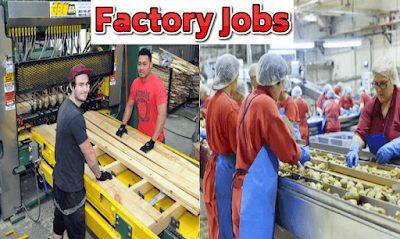Factory Worker Jobs in New Zealand. The average annual income for factory workers is estimated to be $42,800. Inexperienced workers may start out at minimum wage or training wages. These projections reflect compound annual growth rates based on the category "831 Food Process Workers." The number of factory workers declined from 2006 to 2013, reflecting the overall decline in employment in manufacturing. However, the growth rates cited are higher than the national average. In New Zealand, there are now over 11,000 factory workers.
Factory Worker Jobs in New Zealand
The number of factory workers declined from 2006 to 2013, reflecting the overall decline in employment in manufacturing. However, the growth rates cited are higher than the national average. In New Zealand, there are now over 11,000 factory workers.
 |
| Factory Worker Jobs in New Zealand |
Job opportunities:
Many factory worker jobs
do not require formal qualifications, but many require a lot of on-the-job
training. In some cases, factory workers can receive help with obtaining
national certificates. The salaries for factory workers in New Zealand are competitive
and typically go down as you gain more experience. In some areas, you will be
expected to work long hours. These jobs are generally not glamorous, but they
do pay well. If you have the physical aptitude and are willing to work hard,
factory worker jobs may be for you.
Because of New Zealand's
huge economy, there are many different types of factories in the country. Many
businesses hire foreign workers to fill these positions, including the
Philippines. Since the wages for these jobs are competitive, it is a good idea
to apply if you are not from New Zealand. If you have no prior work experience,
these jobs may be perfect for you. You can also apply for jobs that pay high,
so you can earn more money while learning new skills.
Salary:
If you're planning to
move to New Zealand, you may be wondering what the minimum wage is for factory
worker jobs. This is an issue of great concern for many OFWs. Vangeline McCann,
a YouTube OFW, answered this question in one of her videos. After her initial
video, she received several requests from her viewers. In one of these
messages, a viewer asked her what the minimum wage is for factory worker jobs
in New Zealand.
Despite not requiring any
formal qualifications, factory workers need to be reliable. Although many factory
jobs are low-paying, most don't require any qualifications or education. While
factory workers typically don't need a degree to work in the industry, some
factories require a formal certificate or education. For instance, to work in a
plastics factory, you may need to earn a New Zealand Certificate of
Manufacturing - Plastics (Level 2) certification.
Factory workers are
always in demand in New Zealand. Thousands of businesses need workers to keep
their operations running. Many of them hire foreign workers from other
countries, such as the Philippines. The salaries are competitive for the
position and make it a great option for individuals with limited work
experience. Despite the competition, the benefits of factory worker jobs in New
Zealand are numerous. The high wage level is a great perk for workers with no
work experience.
The average salary for
factory workers in New Zealand is NZD 42,330 annually, which is approximately
PHP 89000 per year. While 50% of factory workers earn less than this, 25% earn
more than this amount. Salary increases are usually dependent on experience, so
the more experience you have, the higher your salary. It is also important to
remember that the salary for factory worker jobs in New Zealand varies widely
from country to country.
On-the-job training required:
There are many advantages
to working as a factory worker in New Zealand. The pay is generally good,
benefits are plentiful, and the work is often based in a factory. Factory
worker jobs in New Zealand require on-the-job training, but are also
highly-skilled and flexible. This is a great job for those who enjoy working
with their hands and flexibility. The benefits are also clear-cut.
Factory worker jobs in
New Zealand may not require formal qualifications, but there are many that do.
Inexperienced workers may start out on the minimum wage, which is usually lower
than the average wage for the region. Some employers will also support their
employees to complete national certificates. MBIE's Tenancy Services website
contains estimates of market rents, as well as downloadable budget plans. Other
industry training organizations such as Competenz and Primary ITO offer
training nationwide and relevant qualifications in most parts of the country.
Compared to other
professions, factory workers in New Zealand earn higher wages than their
counterparts in many other countries. On average, factory workers earn NZD
42,330 per year and around $20 an hour, depending on the industry. Most factory
jobs are entry-level positions that require little or no education, but these
can be lucrative careers that raise your standard of living. The pay for these
jobs in New Zealand can be very high, as long as you are willing to undergo
on-the-job training.
A factory worker salary
in New Zealand is very good compared to the Philippines. Factory workers earn
an average of 150,700 PHP per month, which is enough to pay for basic expenses
such as housing and other necessities. Although these jobs can be demanding,
they can be lucrative if you can work long hours and put in hard work. Factory
workers in New Zealand can earn $42,800 PHP per year, making this job a good
choice for many reasons.
Career paths:
Factory worker jobs in
New Zealand do not usually require any formal qualifications. However, some
positions may require extensive on-the-job training and a qualification, either
as a certificate or a diploma. The New Zealand Certificate of Manufacturing -
Plastics (Level 2) is one such qualification. A number of employers require
reliable employees and may also require drug testing and drug screening. There
are many ways to get a job in the manufacturing industry.
Factory worker jobs are
widely available, offer competitive pay and can be highly versatile. They are
open to both men and women and can involve working indoors. This job role also
requires physical fitness and adherence to the regulations of the factory.
There is a requirement to possess a driver's license. In New Zealand, factory
workers are paid up to $60,889 a year. Compared to the high cost of living in
the Philippines, factory workers can enjoy a good annual salary.
There are many
opportunities for factory worker jobs throughout the country. In the South
Island, there are more than 160 breweries. There are opportunities for factory
workers from all over New Zealand to clean and maintain their breweries. Other
opportunities include working as a packer or bottler checker. Interviews are
conducted by a discussion about beer. These industries are regularly listed as
the best places to work in New Zealand.
Factory worker jobs are
not glamorous, but they can offer good pay. A factory worker's physical fitness
is essential for their job. Many factories conduct drug tests and may require a
driver's license. If you have the desire to advance into a managerial position,
you may want to consider studying for a qualification. A career as a factory
worker can be rewarding and fulfilling. If you are physically fit and willing
to work hard, this job can be a great choice.
Average salary for
factory workers is $42,800 NZD, but you may have to start on a minimum wage or
training wage to earn this income. However, factory workers can also go on to
complete formal qualifications to earn higher wages. Depending on the location
of the factory, you might start out on a training wage or on the minimum wage.
However, it is important to note that the number of factory workers in New
Zealand has decreased by 7% from 2006 to 2013. This trend reflects a general
decline in manufacturing employment.








0 Comments